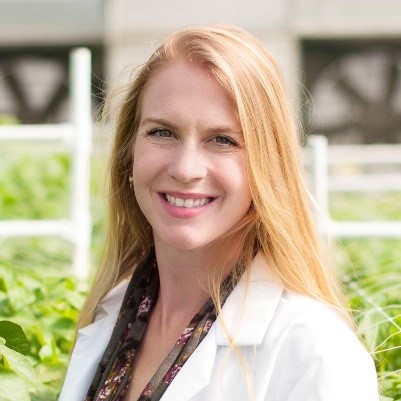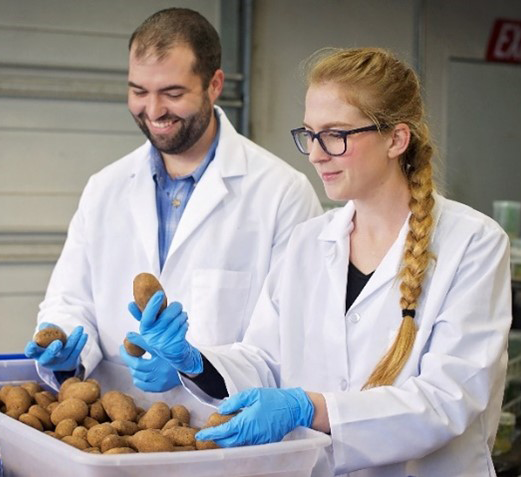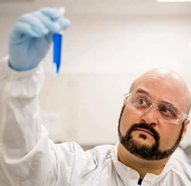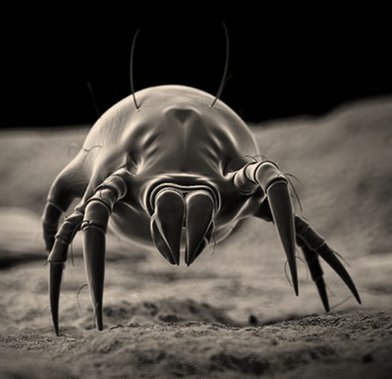
Jenny Durrin says she would never have become the director of the Seed Potato Germplasm Program at the University of Idaho, Moscow, without the experience she gained through the Idaho IDeA Networks of Biomedical Research Excellence (INBRE) program. Another Idaho INBRE alum, Steve Van Horn, credits the program with enabling him to start a career in the pharmaceutical industry.
Providing undergraduate students with research opportunities and preparing them for STEM careers in biomedical sciences are key goals of INBREs across the country, including Idaho’s program. Here, we share Jenny’s and Steve’s stories and the pivotal role that INBRE played for them.
From Pre-Med to Plant Researcher
Jenny started college at the University of Idaho as a pre-med major and applied for an INBRE fellowship to gain lab experience. Because she was interested in plants and naturopathic medicine, she was offered a spot in a lab studying viruses that infect crops such as sugar beets and potatoes. She enjoyed the research so much that she decided to pursue a career in science instead of medicine.

Jenny completed her master’s research in the same lab and continued working there for a short time after she graduated. She then spent 2 years in another University of Idaho lab developing a product to eliminate a potato pest before becoming the director of the Seed Potato Germplasm Program. The program maintains a vast tissue culture collection of many potato varieties and is constantly adding new types, including some with unique traits like pathogen resistance or a lower glycemic index. The program sends about 250,000 plants to seed potato growers each year, ensuring that all the plants are healthy and free of disease to result in a safe, quality food supply. “My experience studying plant pathogens means that we can better prevent them from coming into our potatoes and provide the cleanest possible potatoes to growers,” Jenny says.
At any given time, Jenny oversees about 12 undergraduate students working with the program. “I really encourage the students to apply to INBRE if they’re interested in scientific research because I wouldn’t be where I am without that experience,” she says.
Science as a Second Career

For more than a decade after graduating high school, Steve Van Horn mostly worked as a manager for call centers and banks. Although he enjoyed leading people, he couldn’t shake the feeling that something was missing. So he returned to college to find a field he was passionate about—not expecting it to be biology. Steve says he was initially terrified to take a biology class during his first year. But as the semester went on, the subject became fascinating, and he would stay up late into the night digging deeper into various topics. “One of those nights around 3 a.m., it was like the proverbial light bulb came on over my head,” he says. “I thought, What do you know? I found something that I’m passionate about.”
Steve joined the INBRE program the next semester on the recommendation of his professors. During the kickoff meeting, he vividly remembers feeling like an imposter as other students he considered to be the “best and brightest” surrounded him. “Then the speaker said, ‘I would be willing to bet that the vast majority of you are wondering how in the world you even got here.’ Everybody started nodding, and he said, ‘You were chosen because of the proven work that you’ve done, and that choice was not made lightly,’” Steve recalls. “That gave me confidence to step forward in science and think, I do belong here.”
Through INBRE, Steve worked on various research projects, including one with the Idaho Department of Environmental Quality to improve the water quality of a local lake and another at a winery studying the microbiology of wine. He also interned at ALK-Abello, Inc. (ALK), a pharmaceutical company that focuses on immunotherapies. After graduating, he worked with a stream ecology professor and spent a year as the INBRE coordinator for North Idaho College, Coeur d’Alene. He thoroughly enjoyed the work, but after his daughter was born, he felt he needed a job offering more financial security. He reached out to ALK, and they hired him soon after.

Steve now works in quality assurance for ALK, overseeing equipment and facilities. He also supervises their mite department, which produces billions of dust mites each year so that proteins can be extracted from them to create allergy treatments. In 2021, he mentored an INBRE intern who was placed at the company, just like he was years ago. “Every student in the sciences who dreams of making a difference in this world should join an organization like INBRE that will give them real-world experience and build connections,” Steve says.
The Idaho INBRE program is supported by NIGMS grant P20GM103408.

